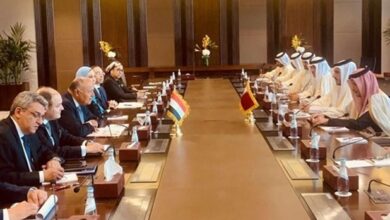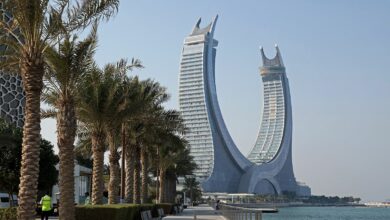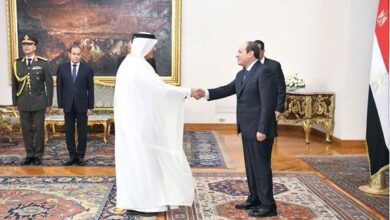On 9 June on the sidelines of a visit to Qatar by President Mohamed Morsy's assistant for foreign affairs Essam al-Haddad and Minister of Petroleum and Mineral Resources Sherif Haddara, the Gulf Kingdom announced it would provide Egypt with 5 shipments of liquefied natural gas so that Egypt could meet its summertime energy demands.
The announcement can be seen as yet another example of the remarkable rapprochement between Egypt and Qatar in the wake of the January 2011 revolution, in particular since the election of Morsy as Egyptian president.
Relations between both states have witnessed an unprecedented shift, so much so that it has aroused suspicion amongst some political groups wary of the intentions behind the rapprochement, reflected in both economic support and high-level official visits.
On the topic of economic and financial backing, Qatar has offered Egypt an economic support package of US$5 billion – including $1 billion in grants, $4 billion in deposits at Egypt's central bank and $3 billion in treasury notes bought from the government.
Moreover, Qatar has also spared Egyptian companies the need to undergo the “kafeel” (or sponsorship) system to operate within Egyptian territory. The kingdom even revealed intentions to pump investments in Egypt worth up to $18 billion.
Since Morsy's inauguration in 2012, officials from both states have exchanged 9 visits both on the presidential and ministerial levels, a fact that carries clear political and economic significance.
And yet this follows an extended period of tensions under former President Hosni Mubarak, attributed to personal motivations and uncordial relations between the ex-president and the emir of Qatar.
That coldness became all the more evident against the backdrop of the 2006 Israeli aggression on Lebanon and different Arab states’ responses to it. At the time, Egypt's state-run al-Gomhurriya newspaper published an article that described Qatar as "a state that boils down to a woman and satellite channel," referring to Qatar's first lady, Sheikha Mozah, and the Al Jazeera satellite channel. The Israeli offensive on the Palestinian Gaza Strip in 2008 only turned up the heat as Qatar implicitly accused Egypt of complacency by closing the Rafah crossing.
But changes brought on by the 2011 revolution prompted both countries to reassess their positions. These changes materialized with the election of a Muslim Brotherhood candidate as Egyptian president and Egypt’s adoption of a new foreign policy agenda, attempting to re-approach states left out in the cold before the uprising. Egypt's economic crisis and Qatar's willingness to lend a hand has also played a role.
And so Qatar's regional and international aspirations have coincided with Egypt's political and economic weaknesses. Therefore, a rapprochement with Cairo can be seen as a means to boost Doha's regional standing by leaning on Egypt's geostrategic weight.
Given the common interests between both countries, the seemingly strategic rapprochement between Qatar and Egypt can be expected to continue and develop, especially if Cairo's relations with Riyadh and Abu Dhabi remain chilly.
Qatar meanwhile, like the rest of the Gulf, needs strategic balance, especially considering its problems with neighboring Iran. Egypt is strongly tipped to provide that balance should it decide to play that role.
This would require the re-activation of relations between Egypt and the wider Gulf, so adversely affected by the 2011 revolution. Gulf states fear the long-arm impact of the Egyptian uprising in their own territory, especially in the wake of the Muslim Brotherhood’s rise to power – widely viewed as a menace to Gulf governments, state-tribe structures with a distinctly religious and traditional Salafi undertone.
The piece is a summary of an analytical report by Al-Masry Information and Studies Center




